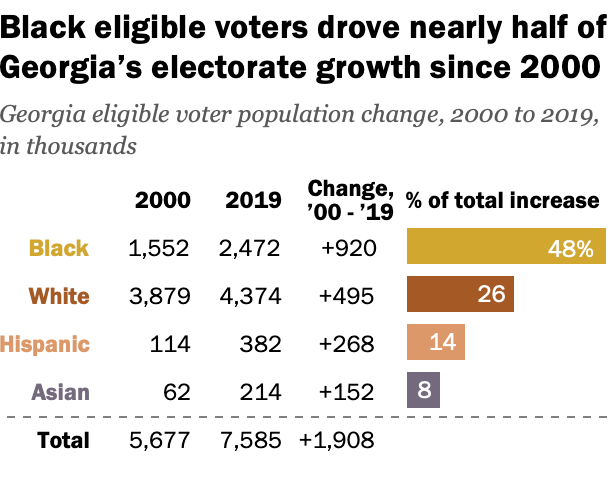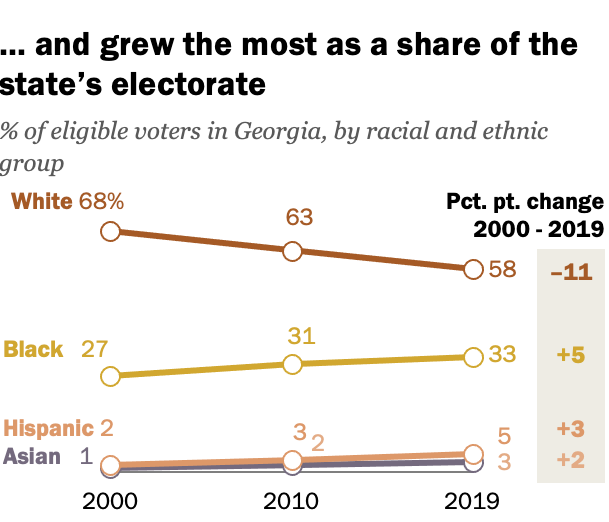By Ryan O’Connell
Edited by Marilyn Go, Jim Harbison, and Jacki Swearingen
With its robust economy, Georgia has grown rapidly, attracting a large influx of new residents from other states. These waves of in-migration have profoundly changed the state’s political make-up over the last two decades because most of the newcomers are African American. Many of them hold college degrees and are affluent; the largest group has moved from New York State. Georgia’s Latino and Asian-American communities, while smaller, have also grown significantly.
All three groups lean heavily Democratic, and their growth has turned Georgia from deep red into a battleground state. The number of eligible voters in Georgia has jumped 30% over the last 20 years, and Black Americans represent half of that increase. Meanwhile, whites constitute only about a quarter of new voters.
Latinos and Asian Americans represent a relatively small slice of the Georgia electorate. However, their numbers have increased significantly; they account for 14% and 8%, respectively, of the growth in the voters since 2010. Hispanic voters increased by 235% and Asians by 245%, compared to 59% for Blacks and 12% for whites. (Black Latino and Asian Americans have been key to Georgia's registered voter growth since 2016).

Source: Pew Research
These shifts have radically altered the state’s demographic and political mix. In 2000, white voters overwhelmingly dominated the electorate, representing almost 70% of potential voters. However, over the next 20 years, white voters’ share dropped by 11 points to 58%. Black Americans’ share rose five points, to 33% of all eligible voters. Hispanics and Asian Americans’ shares increased more modestly, to 5% and 3% of eligible voters, respectively.
In total, the three minority groups rose to over 40% from about 30% of eligible voters over those ten years. While white voters grew modestly, to 4.4 million from 4 million, minority voters shot up to 3 million from 1.7 million. This trend has created the potential for a significant shift in the balance of power between whites and minorities in Georgia.

Source: Pew Research
Voters in the metropolitan Atlanta region, which is mostly Democratic, now represent 54% of the state’s voters. Other metropolitan areas such as Savannah, Macon, and Augusta also lean Democratic.
In 2018, Stacey Abrams, a Black woman, came very close to winning the race for governor. Then, in 2020, a political earthquake shook Georgia, as a Democratic Presidential candidate won the state for the first time since Bill Clinton carried it in 1992. Georgians also elected two Democrats as Senators, one of whom, Raphael Warnock, is African American.
A History of Gerrymandering and Voter Suppression
On the surface, Georgia, a state with a long history of voter suppression, seemed to embrace multiracial democracy at last. But the reality is far different; old habits die hard.
Georgia is a highly gerrymandered state, and state officials continue to use numerous techniques to diminish the power of minority voters. The state is probably balanced between Democratic and Republican voters at this point. Nonetheless, Republicans hold about 60% of state Senate seats and state House seats. Georgia’s Congressional delegation is also lopsided, with nine Republican-controlled districts and only five Democratic-controlled ones.
Federal Judge Ordered Georgia to Redraw Maps
In October 2023, a federal district judge in Atlanta ruled that Georgia’s electoral maps violated the Voting Rights Act of 1965 by diluting the power of Black voters. Judge Steve C. Jones of the Northern District of Georgia ordered the state legislature to redraw the maps for state and Congressional districts. The legislature did so at a special session beginning November 29, and Governor Brian Kemp signed new electoral maps into law on December 8.
The new maps created an additional majority Black congressional district, as the judge ordered. However, Democrats and Black voters who had brought this case (as well as two other lawsuits challenging State Senate and House maps) objected to the new maps. They criticized the congressional maps for shifting Lucy McBath, a Democratic congresswoman, into a mostly Republican district. Nonetheless, Judge Jones ruled that the redrawn maps complied with the Voting Rights Act and his previous order that an additional majority Black district be created (Georgia Republicans Add Majority-Black Congressional District at Expense of McBath).
Judge Jones observed that “redistricting decisions by a legislative body with an eye toward securing partisan advantage do not alone ’violate’ the Voting Rights Act.” On this issue, Judge Jones cited the Supreme Court’s ruling in Rucho v. Common Cause (2019) that disputes involving possible partisan gerrymandering (as opposed to racially based gerrymandering) are not within the purview of Federal courts.
Under the revised maps, Republicans are likely to maintain their 9-5 majority in Georgia’s congressional delegation.
African Americans are severely under-represented in government on the county level. The deck is stacked against them because of electoral practices and the legislature’s “unprecedented efforts to intervene in local redistricting,” according to the Brennan Center for Law and Justice at New York University (Local Lockout in Georgia).
Large Voter Purges
While Brian Kemp was Secretary of State and preparing to run for Governor, he purged 1.4 million citizens from Georgia’s voter rolls over the course of eight years. In 2017 alone, Kemp knocked 750,000 people off the rolls, knowing that Stacey Abrams would run against him for Governor in 2018.
Some of the purges may have been routine, but many of those eliminated were Black voters. The purges may have been an important factor in the gubernatorial race, which Abrams lost by only 55,000 votes.
New Voting Law Targets Minorities, City Dwellers
The 2020 election triggered a strong counter-reaction in Georgia. In March 2021, the Republican-dominated state legislature rushed through a bill in record time that was designed to suppress the votes of minorities and urban Democrats. The Republicans called the bill, SB 202, an “election integrity law”, even though state audits determined there was virtually no fraud in the 2020 election.
The new law made registering to vote and voting more difficult for minorities and city-dwellers by:
-
Imposing tougher voter ID requirements
-
Restricting the availability of mail-in ballots and shortening the deadlines for submitting them
-
Reducing the number of drop-off boxes for mail-in ballots in Atlanta and other cities
-
Cutting back the hours for using drop-off boxes
-
Prohibiting the use of mobile voting buses
-
Allowing private citizens to file an unlimited number of challenges to voters’ registrations
-
Banning anyone except poll workers from handing out water and food to voters standing in line
Why the last prohibition? Voters in Atlanta, especially in mostly Black neighborhoods, often must wait for hours in the blazing Georgia heat to cast their votes. The legislature clearly intended to discourage these minority citizens from casting their votes.
Before the 2020 election, Georgia’s Secretary of State supervised most aspects of elections, including tabulating votes and resolving disputes about voting. Secretary Brad Raffensberger, a Republican, discharged his duties honorably and refused Donald Trump’s request that he “find 11,720 votes” to swing the election in Trump’s favor.
However, In SB 202, the legislature drastically cut back the Secretary’s authority over elections and created opportunities for other elected officials to intervene in election disputes. The Secretary of State is no longer the head of the State Election Commission. Instead, Georgia legislators appoint the chair of the commission. These changes could allow interference by partisan actors in contested elections.
Frivolous Challenges to Voters’ Registrations
Activists have abused their new power to challenge voter registrations under SB 202. A handful of conservative activists--six--filed a total of 100,000 challenges in 2022, according to ProPublica (Close to 100,000 Voter Registrations Were Challenged in Georgia). Many of the challenges were frivolous and poorly researched.
These challenges have been used to harass and intimidate voters. And election officials have complained that they must spend a great deal of time reviewing the challenges, which often contain factual errors or focus on minor deficiencies.
What Can You Do?
Even if you don’t live in Georgia, you can help make Georgia’s elections fairer, despite the obstacles created by the legislatures. Helping Georgians to register to vote and monitoring polls are two particularly important ways to help.
The Georgia primaries for Presidential candidates will be held on March 12. The primaries for state and Congressional races will take place on May 21. Early voting for those races will begin on April 29 and last until May 17.
You can volunteer to monitor polls, monitor social media, and contact voters who need information and support. You can fill the last two roles on a remote basis. Get in touch with Common Cause Georgia (https://www.commoncause.org/georgia; 404-524-4598).
If you are a lawyer or a paralegal, you can volunteer for Election Protection (https://866ourvote.org/volunteer), which provides advice to citizens who want to register to vote or who may encounter problems when they try to vote. If you have a relative in law school, ask him or her to volunteer. You can work from your office or home. EP provides training and materials on each state’s election laws and procedures.
If you are not a lawyer, you can also volunteer to serve as a poll monitor with EP.
Election Protection operates under the auspices of the Lawyers’ Committee for Civil Rights Under Law, a civil rights organization, and it has about 100 partners, including Common Cause.
The Brennan Center has outlined several steps that Georgia and other swing states should take to ensure that their 2024 elections are conducted fairly and smoothly (
Are Swing States Ready for 2024?).
